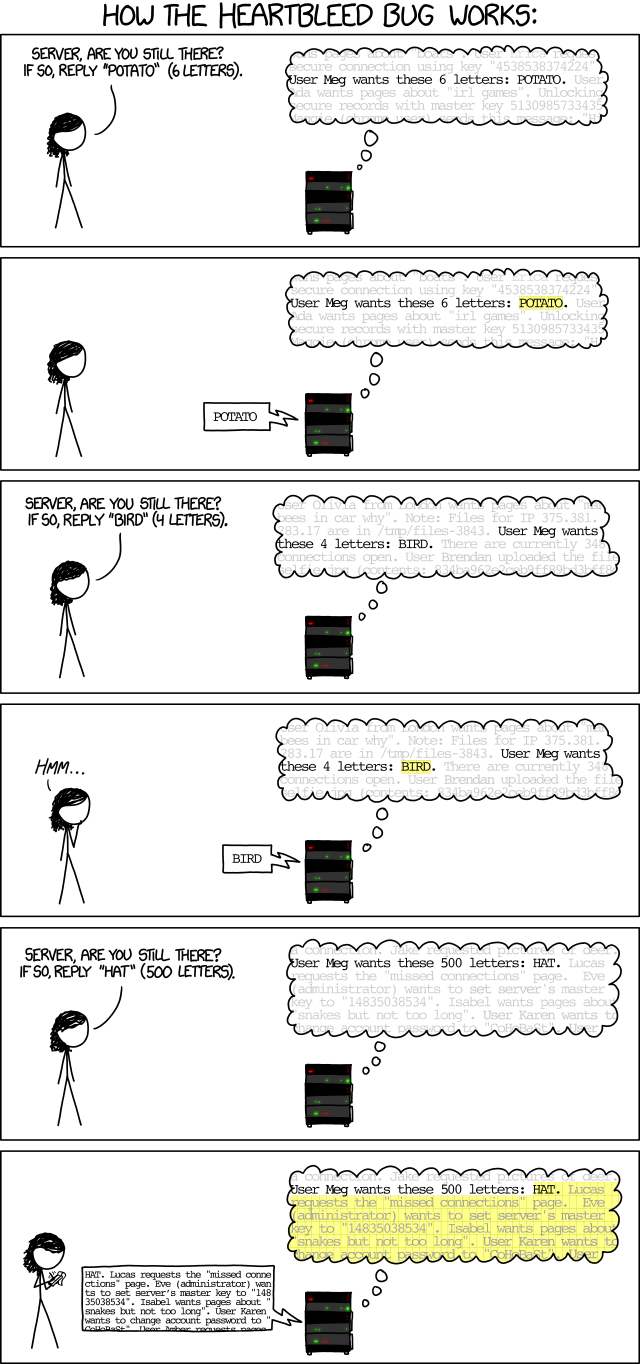- Joined
- Jan 31, 2005
- Messages
- 13,573
- Reaction score
- 1,888
On top of the thread I put in the gaming section, ( https://www.pcreview.co.uk/forums/h...resolved-say-valve-t4063797.html#post14221577 ) I thought I'd post a bit more here for those who don't go in there much.
http://heartbleed.com/
So, are you worried? Are you going to call in sick today and spend the day changing all your passwords like they suggested on GMTV this morning! (No I dont, she does, it was on, I caught that bit on the news!)
(No I dont, she does, it was on, I caught that bit on the news!)
http://heartbleed.com/
The Heartbleed Bug is a serious vulnerability in the popular OpenSSL cryptographic software library. This weakness allows stealing the information protected, under normal conditions, by the SSL/TLS encryption used to secure the Internet. SSL/TLS provides communication security and privacy over the Internet for applications such as web, email, instant messaging (IM) and some virtual private networks (VPNs).
The Heartbleed bug allows anyone on the Internet to read the memory of the systems protected by the vulnerable versions of the OpenSSL software. This compromises the secret keys used to identify the service providers and to encrypt the traffic, the names and passwords of the users and the actual content. This allows attackers to eavesdrop on communications, steal data directly from the services and users and to impersonate services and users.
Am I affected by the bug?
You are likely to be affected either directly or indirectly. OpenSSL is the most popular open source cryptographic library and TLS (transport layer security) implementation used to encrypt traffic on the Internet. Your popular social site, your company's site, commerce site, hobby site, site you install software from or even sites run by your government might be using vulnerable OpenSSL. Many of online services use TLS to both to identify themselves to you and to protect your privacy and transactions. You might have networked appliances with logins secured by this buggy implementation of the TLS. Furthermore you might have client side software on your computer that could expose the data from your computer if you connect to compromised services.
How widespread is this?
Most notable software using OpenSSL are the open source web servers like Apache and nginx. The combined market share of just those two out of the active sites on the Internet was over 66% according to Netcraft's April 2014 Web Server Survey. Furthermore OpenSSL is used to protect for example email servers (SMTP, POP and IMAP protocols), chat servers (XMPP protocol), virtual private networks (SSL VPNs), network appliances and wide variety of client side software. Fortunately many large consumer sites are saved by their conservative choice of SSL/TLS termination equipment and software. Ironically smaller and more progressive services or those who have upgraded to latest and best encryption will be affected most. Furthermore OpenSSL is very popular in client software and somewhat popular in networked appliances which have most inertia in getting updates.
So, are you worried? Are you going to call in sick today and spend the day changing all your passwords like they suggested on GMTV this morning!
 (No I dont, she does, it was on, I caught that bit on the news!)
(No I dont, she does, it was on, I caught that bit on the news!)



